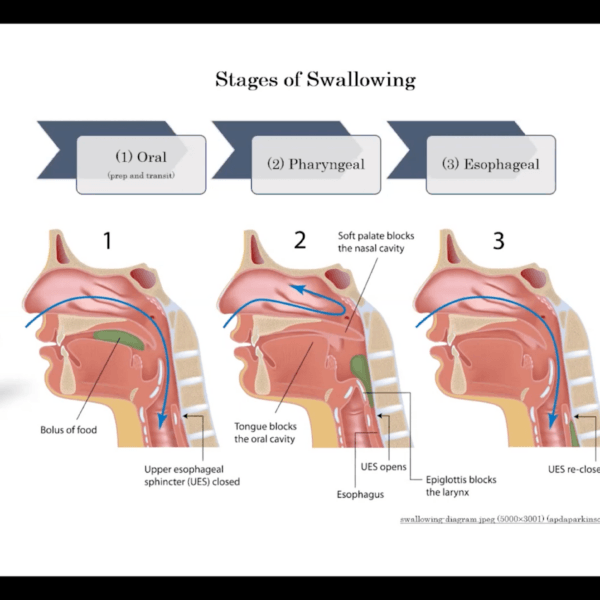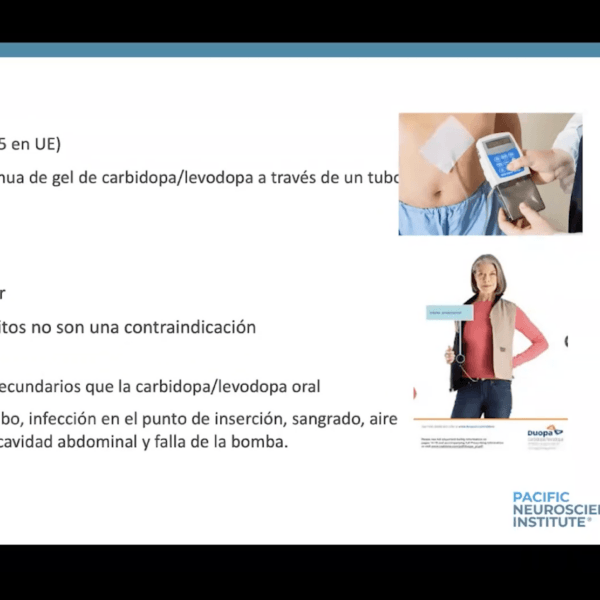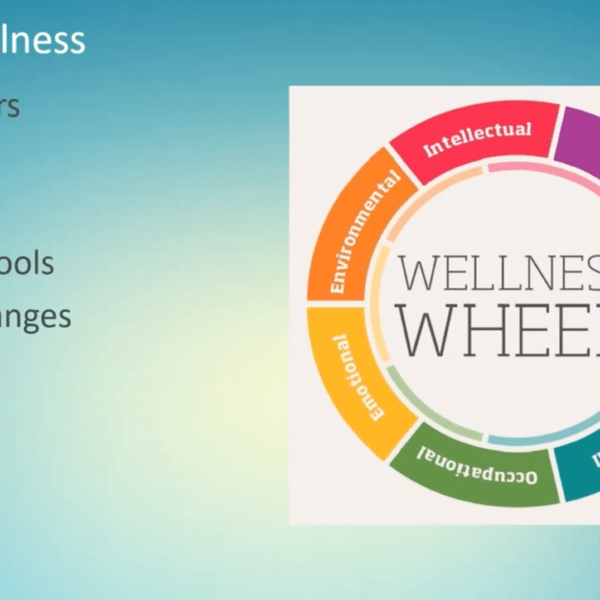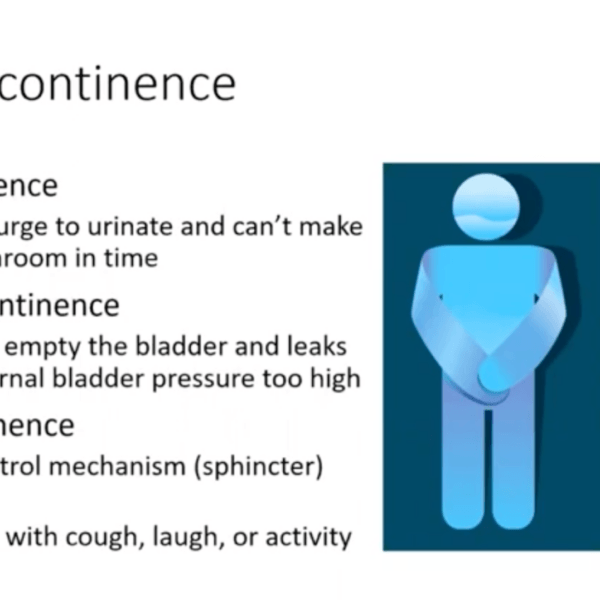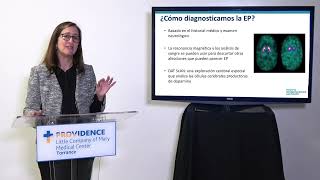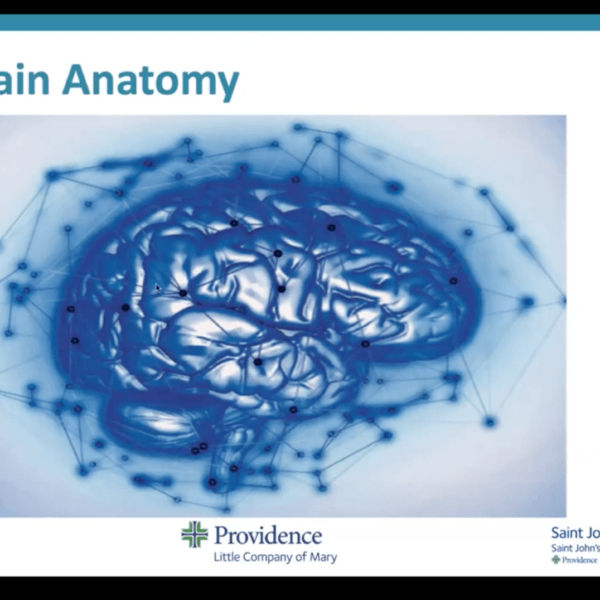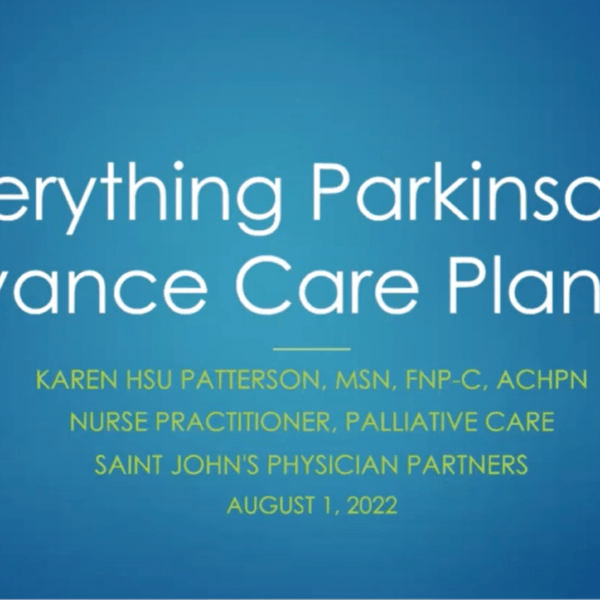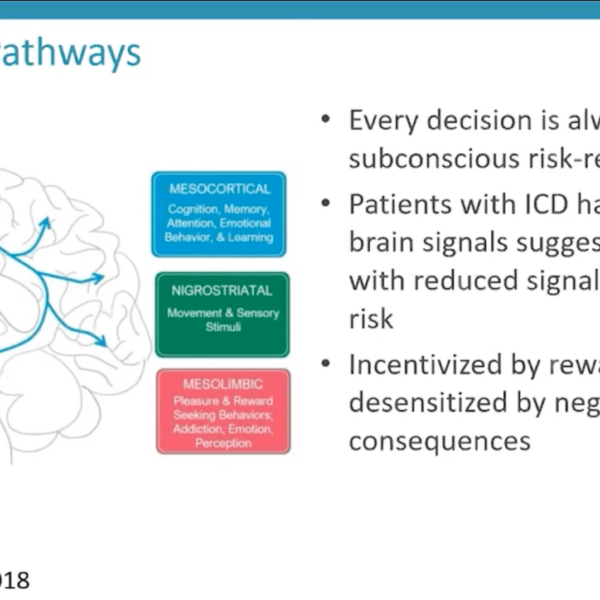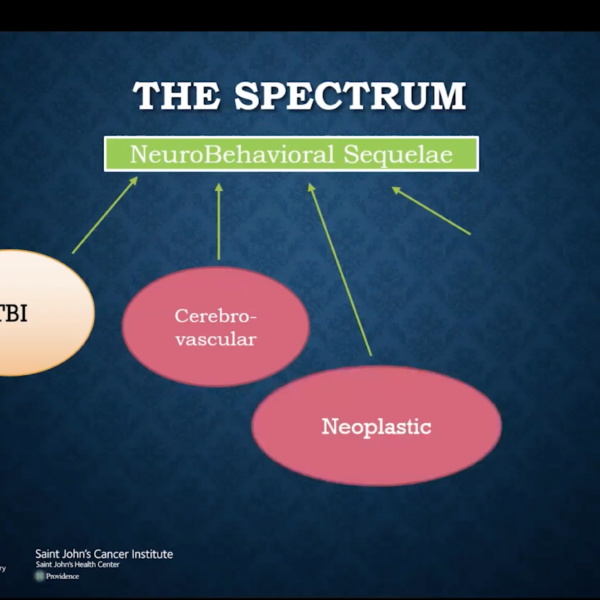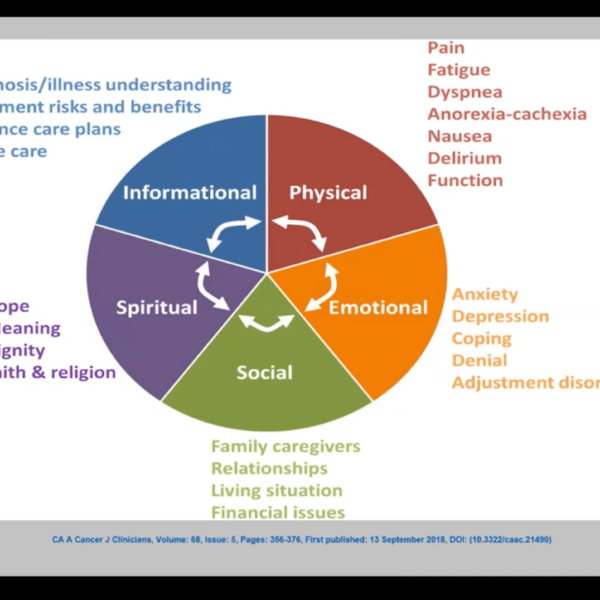Webinar
Video
23. Swallowing, Speech, and Cognition in Parkinson’s Disease
Carol Park, MS, MA, CCC-SLP, Speech Language Pathologist at Pacific Neuroscience Institute, discusses the role of Parkinson’s disease (PD) in swallowing impairment (dysphagia), voice impairment (dysphonia), speech impairment (dysarthria), and cognitive impairments, such as memory, problem-solving, and executive functioning. PNI’s Movement Disorders Center is here for you and your care partners throughout your journey.
Video
La Enfermedad de Parkinson (La EP) y el Parkinsonismo con Natalie Diaz, MD | Nov 2022
Natalie Diaz, MD, una neuróloga certificada por la junta con capacitación en trastornos del movimiento en el Centro de Trastornos del Movimiento del Pacífico en el Pacific Neuroscience Institute (PNI) en Torrance, CA, habla sobre el tratamiento de la enfermedad de Parkison y nuevos enfoques para el cuidado del paciente. El Centro de Trastornos del Movimiento del PNI está aquí para usted y sus compañeros de atención durante todo su viaje.
Video
22. Parkinson’s Disease Care Partner Forum
Sheila Moore, MSG, LCSW, Social Worker, and Melita Petrossian, MD, Director of the Pacific Movement Disorders Center at Pacific Neuroscience Institute (PNI) in Torrance and Santa Monica, CA, discuss the role of Parksinson's disease (PD) care partners in navigating the road ahead. In the open forum webinar, PD care partners discuss planning for the short-term and long-term with their loved ones. PNI's Movement Disorders Center is here for you and your care partners throughout your journey.
Video
21. Parkinson’s Disease and Urologic Health
Guest speaker Mehran Movassaghi, MD, Director of Providence Saint John's Men’s Health Center, discusses Parkinson’s disease and urologic health, including urinary frequency and urgency, urinary flow and obstruction, urinary incontinence, urinary tract infections, and sexual health. PNI's Movement Disorders Center is here for you and your care partners throughout your journey.
Video
La Enfermedad de Parkinson (EP) | La Dra. Natalie Diaz – 2019
La Enfermedad de Parkinson (EP) es una afección degenerativa que afecta al cerebro, provocando la pérdida de una sustancia química del cerebro llamada dopamina y que se manifiesta como temblor en el descanso, ralentización de los movimientos (bradicinesia), agarrotamiento de las extremidades (rigidez) y una variedad de síntomas no motores.
En Pacific Movements Disorders Center, proporcionamos un enfoque hecho a medida para la gestión de la EP, incluyendo el uso de los medicamentos aprobados por la FDA más novedosos y el uso de la estimulación cerebral profunda (ECP) cuando proceda. Tenemos oficinas en Santa Mónica y Torrance, CA, y prestamos servicio a todas las comunidades del oeste de Los Ángeles y del sur de California.
5215 Torrance Blvd #300, Torrance CA 90503
424-212-5361
Video
Brain Tumor Webinar: Community Lecture Q&A
Pacific Neuroscience Institute's Brain Tumor Center experts Walavan Sivakumar, MD, Director of Neurosurgery at (PNI)-South Bay, and Naveed Wagle, MD, Neuro-Oncologist, answer questions about brain tumor treatment in a community lecture hosted by Providence Little Company of Mary. The webinar was moderated by Treasure Joyce of Providence Little Company of Mary's Neuroscience and Stroke Program.
The treatment of a brain tumor requires a multidisciplinary approach. Selecting the best care plan at the correct time requires understanding the tumor pathology, molecular profile, and the patient’s goals. Historically, surgery for a brain tumor was the only option. Now, thanks to exciting new advances, there are more treatment options available, providing patients with more hope than ever before in the fight against brain tumors.
For more information on brain tumors and tools for coping and resilience, contact the Pacific Neuroscience Institute today.
Video
20. Advance Care Planning for Parkinson’s Disease
Karen Hsu Patterson, Advance Certified Hospice and Palliative Care Nurse with Saint John's Physician Partners, discusses planning for the future with Parkinson's disease, including palliative care and advance care planning (ACP). Palliative care is specialized medical care focusing on relief from distressing symptoms or the stress that often comes with serious, progressive, and life-limiting illnesses. Advance care planning, or ACP, is planning for the future to ensure that your medical team has an understanding of your health care preferences. By considering your options early, you can ensure the quality of life that is important to you. PNI's Movement Disorders Center is here for you and your care partners throughout your journey.
Video
19. Parkinson’s Disease & Behavioral Issues – Impulse Control Disorders, Hallucinations, and Delusions
DISCLAIMER: The behavioral issues discussed in this webinar are not universal symptoms of Parkinson's disease.
Melita Petrossian, MD, Director of the Pacific Movement Disorders Center at Pacific Neuroscience Institute (PNI) in Santa Monica, CA, discusses contributing factors, risk factors, and management of behavioral issues for people living with Parkinson's disease, including various types of hallucinations, illusions, and delusions, as well as impulse control disorders (ICD) and ICD management. PNI's Movement Disorders Center is here for you and your care partners throughout your journey.
Video
Brain Tumor Webinar: Anxiety, Depression, and Neurological Disease
Shanti Gowrinathan, MD, Director of Psycho-Oncology and Cancer Support Services at Pacific Neuroscience Institute, discusses the relationship between brain tumor treatment, anxiety, depression, and neurological disease. The webinar was hosted by Ana Rocha, a Nurse Practitioner at Providence Saint John's Health Center.
May is Brain Tumor Awareness Month. We “Go Gray in May” and celebrate our patients, their loved ones, and their important journeys. Our brain tumor patients and their loved ones often report that they feel unseen, overshadowed, and isolated. A “rare” or “uncommon” diagnosis of a brain tumor can be challenging in the extreme, but may not be externally visible in its signs or even in its treatment side effects.
During Go Gray In May, we host a series of educational, informative, and fun events for our community to interact, socialize, express themselves, ask questions, learn about specific topics, and share their own experiences.
For more information on brain tumors and tools for coping and resilience, contact the Pacific Neuroscience Institute today.
Video
Brain Tumor Webinar: What To Expect From Palliative and Supportive Care
Pacific Neuroscience Institute hosted guest speakers Brian D. Madden, MD, and Andre J. Yu, MD, at Providence Saint John's Health Center to discuss what to expect if you have been referred to supportive and palliative care. The webinar was hosted by Ana Rocha, a Nurse Practitioner at Providence Saint John's Health Center.
May is Brain Tumor Awareness Month. We “Go Gray in May” and celebrate our patients, their loved ones, and their important journeys. Our brain tumor patients and their loved ones often report that they feel unseen, overshadowed, and isolated. A “rare” or “uncommon” diagnosis of a brain tumor can be challenging in the extreme, but may not be externally visible in its signs or even in its treatment side effects.
During Go Gray In May, we host a series of educational, informative, and fun events for our community to interact, socialize, express themselves, ask questions, learn about specific topics, and share their own experiences.
